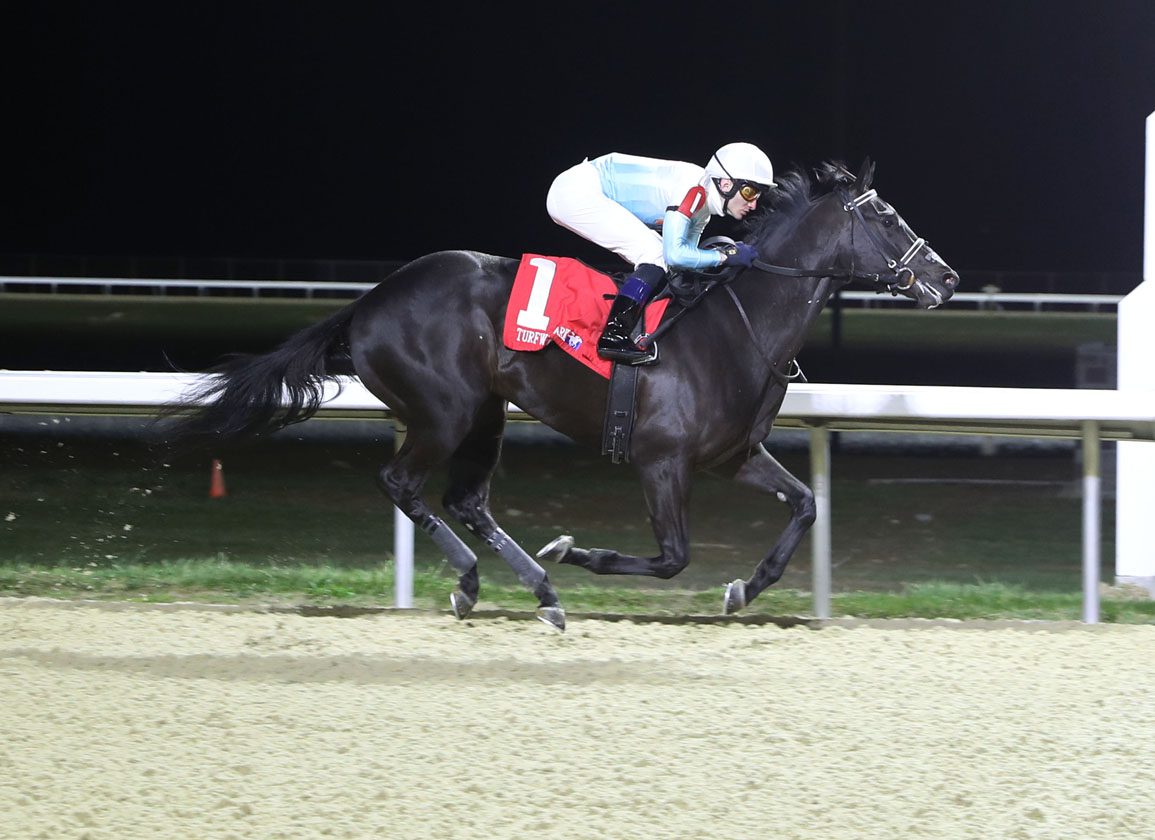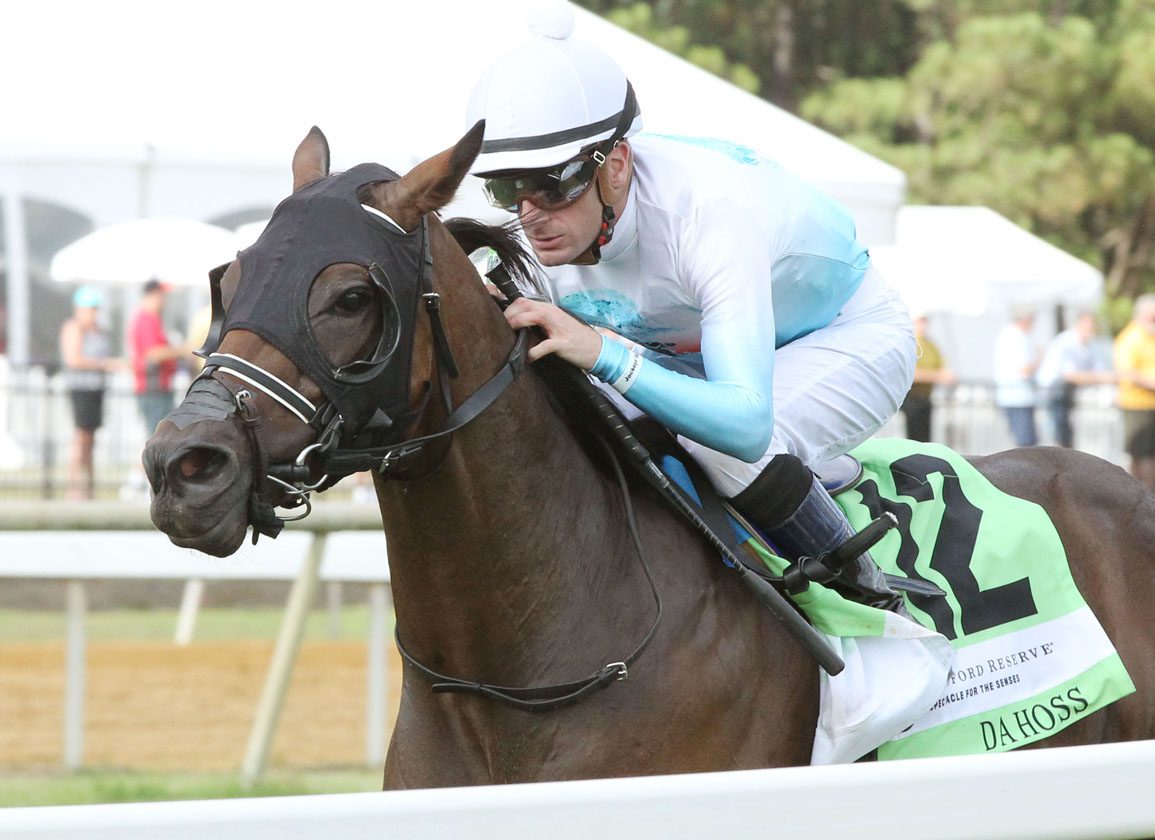If you pay close enough attention, you might start to recognize the same faces leading horses through the Churchill Downs paddock multiple times over the course of an afternoon of racing.
Of course, due to the current operating rules not allowing spectators on the Louisville, Ky., racetrack, you're limited to watching races from the perspective of the track cameramen. Paired with the face mask every groom leading a horse is required to wear, it's a little harder to watch for Jerry Dixon during the four to six races he works every day.
Or maybe it's the color of his skin that helps Dixon unjustifiably fade into the background.
As a Louisville native, the 52-year-old has been paying extra attention to the recent Black Lives Matter protests after the police killings of Breonna Taylor and David McAtee.
Dixon had been to McAtee's barbeque joint in Louisville's West End multiple times over the years, and said it's always crowded because the food is so good. Police arrived to disperse the crowd the evening McAtee was shot due to Mayor Greg Fischer's curfew, but not because protestors were congregating there. In fact, the protests were mainly happening uptown, not in the West End.
“Real talk: I have tears running down my face for my city,” Dixon wrote on Facebook the morning after McAtee was killed, pleading for a nonviolent community response to the police shooting. “Watching the news on the outside looking in, I want to join the protest but I'm going to do it this way […] Pray for my city, pray for my country, pray that our God give us the justice for all.”
Racism in the world of horse racing is just as prevalent as it is outside the game, with few black trainers and jockeys making it to the sport's top levels. Asked about black horsemen getting a fair shake, Dixon admitted they often don't get the same opportunities for success as those of a different skin color.
“But that's just the way the world is,” he said. “And it's sad, too, because we're losing a lot of old-school horsemanship knowledge with fewer and fewer American grooms out there.”
For his part, Dixon might be easier to recognize when you look for the relaxed countenance of the horse he's handling. He is a true throwback horseman, a remnant of a bygone era, according to multiple trainers employing his services. They are all quick to acknowledge that if they have a racehorse who is particularly nervous or difficult to handle in the paddock, Dixon is who they want handling that horse.
“He's probably one of the best I've ever seen when it comes to handling a nervous horse in the paddock,” said Kentucky-based trainer Tommy Drury. “I think it's mostly experience, but it's also that little extra 'something' that all the good horsemen seem to have. I think it's just a natural ability. It's almost like he can feel what a horse is gonna do in the paddock before they do it and stay a step ahead of them.”
So why does Dixon handle so many horses each race day? He doesn't care for all of them on a regular basis; it'd certainly be a challenge to groom the hundreds of horses he works with over the course of a race meet.
Instead, Dixon has built a thriving business out of Churchill Downs' receiving barn. When trainers ship their horses to Churchill on the day of a race, whether from another track or a local farm or training center, they are stabled in the receiving barn near the stable gates. It can be difficult for those trainers to bring a groom to the track for each horse, especially when that groom usually has several other horses back home they are caring for.
That's where Dixon steps in. Once the horse trailer arrives at Churchill, Dixon meets the trainer or the van driver to help unload the horse and settle him or her into the stall. Then he'll unload all the equipment and take down specific instructions for that horse.
Does the horse require running bandages on all four legs, just two legs, or none at all? Which bridle does the horse need? If he wears blinkers, should they be put on in the paddock or in the barn before leading the horse over?
Dixon can also meet the state veterinarian for the administration of Lasix, and he'll monitor the horse up to and after the race to watch for any problems.
“Look, all I have in this world is my word,” Dixon said. “That's how I got my business … If I say I'm gonna take care of you, I'm gonna take care of you.
“What a trainer wants is when they ship in, they want to be able to know that their horse is alright while they go eat, while they go to the frontside with their owners. No trainer wants to sit back there at the receiving barn in a suit!”
With multiple horses shipping into the receiving barn for each race day, Dixon employs a small crew of three to seven trusted assistants, depending on how busy he is, including his son, Jerry Jr., whom he hopes will eventually take over the business.
Every member of the crew is dressed professionally, usually wearing khaki slacks and a collared shirt, which makes a difference to the trainer and to their owners, Dixon said.
He calls his business “Dixon, Inc.,” though he laughed and joked that the “Inc” doesn't stand for “Incorporated,” but rather, “I Need Cash.”
That self-deprecating humor is a trademark, as is Dixon's work ethic. He walks hots every morning for trainer Jordan Blair at Trackside, Churchill's training center, and on race days he leaves straight from there to meet trainers at the receiving barn.
When Churchill isn't running, Dixon can be found at one of Kentucky's other tracks, like Ellis Park and Keeneland, or as far away as Indiana Grand, Belterra Park, Mountaineer, or even Arlington on Kentucky's dark days. It just depends where the horse trailers are heading that day, and whether he can catch a ride.
It keeps him out of trouble, Dixon said, echoing the reason he was introduced to racing in the first place.
Dixon grew up in Louisville, attending Butler High School in the late 1980s. During the summer between his junior and senior year, Dixon's uncles brought him to the racetrack to help keep him out of trouble, and quickly found him a morning job walking hots for trainer Jerry Romans.
His uncle Danny taught him how to walk horses, and his uncle Mitchell showed him “everything else,” like how to bridle a horse. Dixon remembered that his uncles used to charge him $5 each to apply bandages when he ran a horse, until trainer Steve Decker taught him how to do it for himself!
After he graduated high school, Dixon returned to the track until he got married in 1990 and moved to Northern Kentucky. He kept up with the horses as a hobby, working at Turfway Park on the weekends, but for 10 years his primary job was in roofing.
Eventually Dixon gravitated back to the track, and he noticed a trend at the receiving barn. Guys wanting a job would run to greet trailers as soon as they pulled up, and Dixon thought it was unprofessional.
“I thought, 'I can organize this,'” he remembered. “Some of my first clients were Wayne Mackie and Steve Casey, and of course Tommy Drury.”
Dixon's job doesn't garner him a lot of outside attention, so his name isn't particularly well-known outside the backstretch. He isn't usually handling the high-dollar graded stakes-caliber Thoroughbreds that the media focuses on, simply because there just aren't as many of them as there are lower-level runners.
“Look, when I was younger, it mattered to me whether their odds were higher than 10 to one,” Dixon admitted. “Now, I just want to focus on doing right by my clients.”
Still, the good horses Dixon has handled stick with him, especially Rahystrada, three-time winner of the Arlington Handicap for trainer Byron Hughes. The horse was fourth in the Arlington Million in 2010 and third in 2012, bringing Dixon a whole new level of excitement.
“The chance to work with good horses is a really nice opportunity,” Dixon said. “But really, there are a lot of good, honest runners out there that I like just as much.”
As the world outside the racetrack continues to wrestle with ideas like systemic racism, the racing industry ought to be willing to do the same thing.
But how? What can we do to be better?
Dixon thought about it for a moment, considering.
“We just want to be equal,” he said, leaning in. “Put a black person on the Kentucky Horse Racing Commission, a black person in the racing office. I think that'd be a good start.”
The post Breeders’ Cup Presents Connections: ‘All I Have In This World Is My Word’ appeared first on Horse Racing News | Paulick Report.
Source of original post
#TwinSpiresReplay pic.twitter.com/i4icyNNYlN
(@TwinSpires) March 15, 2024



